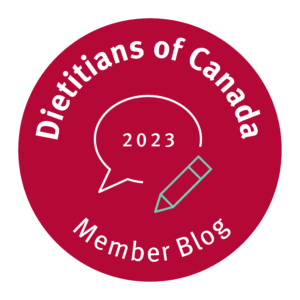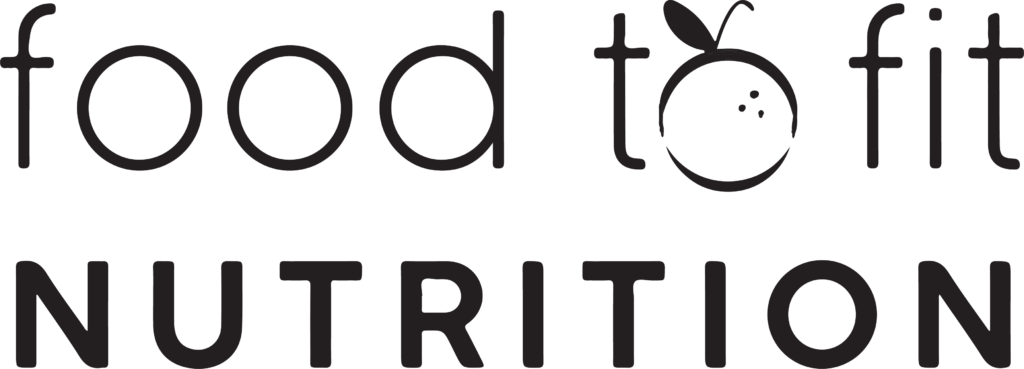
Nutrition for the 4th Trimester
Written by Brooke Bulloch, RD and mom. Edited by Robyn Price, perinatal RD.
My son was born unexpectedly via c-section at 35 weeks’ gestation. As a dietitian I knew postpartum nutrition was important, but as a new mom I was overwhelmed with new tasks, jitters of excitement and anxiety, and fatigue. No matter the birth story, postpartum is exhausting and emotional. This stage requires rest, hydration, and good nutrition to support birth recovery, and to supply energy to care for the newborn baby.
I was surprised by how much time and energy it took to nurse a baby, pump, prepare bottles, clean and sterilize equipment, use the washroom, take a shower, or change my clothes. Looking after my own nutritional intake really took a back seat. Support from loved ones was important to ensure meals and snacks were available, with reminders and opportunities to eat and drink.
I remember hearing and learning so much about nutrition during pregnancy, but little if anything, about postpartum nourishment. This post offers guidance on nutrients of importance during the 4th trimester – the early postpartum months – including go-to snack ideas to maximize nutrition.
Supplementation During Postpartum and Lactation
It is generally recommended to continue taking the prenatal multivitamin for six weeks after birth. The additional iron is useful to replace iron lost during childbirth and postpartum bleeding. If you are anemic, or gave birth to twins consider consulting with a dietitian or health care provider.
Our pediatric and postpartum dietitian, Robyn Price, recommends taking a multivitamin (prenatal or regular) for the entire duration of lactation. This is because, “there are some nutrients that are even higher in demand during lactation than in pregnancy, and will be depleted in breast milk if not consumed daily”. This includes some B vitamins, choline, iodine, and selenium.
CHOLINE
Choline is an essential nutrient that supports cell membrane integrity, neurotransmitters for the brain and nervous systems, and early brain development. Recommended intake is 550mg during lactation (450mg in pregnancy), which is tricky to attain without consumption of organ meats or 2-3 eggs per day.
IODINE
Iodine is a vital component of thyroid hormones. The mother’s thyroid hormone levels affect proper fetal growth and neurological development during pregnancy and after birth. The National Institute for Health suggest increasing iodine to 290 mcg during lactation (from 220mcg in pregnancy). Risk for iodine deficiency increases in those who: do not consume dairy products; who smoke; who do not consume iodized table salt. Getting enough iodine in the diet can be tricky.
SELENIUM
Selenium is a nutrient that plays a role as an antioxidant in reducing oxidative damage, and supports thyroid function. Recommended intake during lactation is 70 mcg (again, higher than in pregnancy). Predominant food sources include: seafood, meat, poultry, eggs, and dairy. The amount of selenium in plant foods depends on the amount of selenium in the soil where grains and other plants are grown.
VITAMIN D
Vitamin D is a nutrient that helps the body to absorb calcium and phosphorous, both of which play a role in building and maintaining strong bones and teeth, preventing osteoporosis. Health Canada recommends that adults up to 70 years of age (including during pregnancy and lactation) receive at least 600 IU vitamin D, but not more than 4000IU daily. There are very few food sources that contain enough vitamin D to meet this requirement. Additionally, Canadians do not produce enough in the skin due to reduced sun exposure in winter months, and the use of sunscreen in summer months. Most prenatal supplements will contain at least 600IU vitamin D. Be sure to include a daily vitamin D supplement if you do stop taking a multivitamin, even through the summer months. Most supplements will come in 1000IU doses per tablet and taking 1000 to 2000IU daily is safe and acceptable.
OMEGA 3
Omega 3 fatty acids, particularly DHA sourced from fish and seafood, is a nutrient that many Canadians are not adequately consuming. DHA contributes many functions in the body’s cardiovascular, pulmonary, immune, and endocrine systems, and reduces inflammatory activity. DHA is especially high in the retina, brain, and sperm. Unless you’re consuming about 5 ounces of fish/seafood weekly, Robyn recommends supplementing 250mg DHA daily (plus whatever EPA comes along with that).
Other Important Nutrients During Lactation
Lactation is an energy expensive process. It requires roughly 500-600 additional calories (more energy than required in your 3rd trimester) to keep up with milk production in the first 6 months postpartum. The extra calories come from both nutrient-dense food sources and the fat stores built up during pregnancy.
Generally, nutrients of importance during lactation include: vitamin A, calcium, iron, folate, zinc, and protein. However, if the person is eating enough overall, they are likely to meet the recommended dietary allowances (RDAs) for these nutrients. If nutrient intake is lower than the nutrient demands for a) the recovering body, and/or b) milk production, the body will break down tissues to meet needs for lactation. Getting enough to eat is important to prevent malnourishment.
CALCIUM
The recommended daily allowance for calcium is the same as pregnant and non-pregnant adults at 1000mg. However, 250–350 mg of this calcium is transferred to the neonate through breast milk. Inadequate dietary calcium intake will not affect the concentration of calcium in human milk. However, to maintain maternal blood calcium levels the body will leach calcium from the bones. Thus, the long-term bone density of the person lactating is potentially at risk. Aim to meet your dietary calcium needs through foods such as: milk, yogurt, or cheese; calcium-fortified plant based beverages; calcium set tofu; beans, chickpeas and lentils; almonds or almond butter; chia seeds; leafy greens. Work with a dietitian if you’re concerned about your calcium intake.
IRON
Iron needs during lactation are greatly reduced compared to pregnancy. Unless there was excessive blood loss at delivery or previous anemia, the total demand for iron during lactation is less than when non-pregnant, if menstruation hasn’t resumed. However, once the period resumes, monthly iron losses will be similar to pre-pregnancy losses during menstruation. Aside from meat, fish, and poultry, other iron-rich foods sources include: egg yolks; beans, chickpeas, and lentils; whole grains; dried fruit; nuts and seeds; tofu.
Importance of Fibre
Fibre is key to support comfortable bowel movements, blood sugar stability, sustained energy levels, and a healthy gut microbiome.
Bowel function and regularity can be altered due to changes in your pelvic floor from pregnancy and childbirth. Fibre aids in strengthening intestinal muscles and in regulating bowel function.
Fibre-rich foods also help with blood sugar regulation, mood stability, and energy levels due to their effect on slowing the digestive process. When we add fibre to energy foods (ie. simple or complex carbohydrates), we slow the rise in blood sugars, offering a more sustained release of energy, and minimizing quick lows or crashes.
A diet higher in fibre can positively change either the microbial population within the gut, or the metabolites they produce. For example, some bacteria thrive on fibre and will grow in number. In contrast, other bacteria thrive on by-products of fibre breakdown. Both demonstrate a benefit to the human body.
Fibre-rich foods such as fruit, veggies, nuts, beans, and whole grains, contain other important nutrients, too. Aim for a daily fibre intake of 25 grams or more.
Food and Snack Ideas
In the early postpartum weeks, you will not always have the time or energy to plan and eat 3 square meals. Yet, trying to survive on coffee until 2pm will likely leave you depleted, stressed, and feeling worse. With assistance from family and friends stock your home with nutrient-dense foods that are easy to prepare or eat with one hand. Aim to eat every 2-4 hours in order to maintain mental and physical energy, energy requirements for lactation, and nutrient needs for recovery.
Pro tip: if you struggle to remember to eat, set a timer on your phone as a reminder to assess thirst and hunger levels, or to grab some food.
Below are a few of my favourite, low-maintenance food items:
- Frozen avocado pieces – added to a smoothie or thawed and mashed into a guacamole dip (eat with veggies, crackers, or tortilla chips).
- Nuts such as almonds, cashews, pecans, walnuts, or peanuts.
- Trail mix made with dried cereal, dried fruit & nuts.
- Canned tuna or salmon – for tuna melts or with crackers. (Hint: “light” tuna is lower in mercury because it consists of small, skipjack tuna. The smaller the fish, the lower the mercury).
- Turkey Bites (processed yes, but nice to have once in awhile as an easy protein source).
- Individual yogurt containers (or yogurt tubes that can be frozen and eaten like a Freezie).
- Home made cookies – add oatmeal, seeds, and/or dried fruit to boost nutrients like iron, protein, and fibre.
- Individual cheese packs or cheese strings.
- Washed, peeled, and cut raw carrots, celery, peppers or cucumbers.
- Washed cherry tomatoes, snap peas, or radishes.
- Pre-made or store-bought hummus or tzatziki dip to go along with fresh veggies, crackers, or pretzels.
- Fresh strawberries, grapes, cherries, bananas, mandarin oranges, or apples.
- Frozen berries, cherries pineapple, or mango.
- Canned peaches or pears.
- Hard-boiled eggs – they’re safe for 3-5 days in the refrigerator.
- Peanut butter or almond butter.
- Triscuit crackers – they pack a little more fibre than most others.
- Fruit smoothie packs: ½ cup frozen fruit + handful of spinach + 1 tbsp of hemp seeds – make into Ziploc bags, store in the freezer, then add yogurt and milk to make a smoothie.
- Whole grain toast or bagels – avocado toast with an egg; PB toast with fruit on top; toasted tomato and cheese sandwich.
- A few of your favourite comfort foods – candies, chocolate, or ice cream!
The 4th trimester can be a tough one so be kind to yourself. Call on family and friends to help make food readily available and to help remind you to eat and hydrate. If you’re looking to meet with a dietitian for assessment and planning, reach out to our team perinatal and infant RD, Robyn Price. Rest up, and enjoy your new baby.
LET'S STAY IN TOUCH
Join our mailing list
Join our newsletter for more non-diet content including practical nourishment, recipes, nutrition myth-busting, and weight inclusive well-being.

Curiosity, self-compassion, food peace. Nutrition assessment, planning, and monitoring + food relationship counseling.
Food to Fit Locations:
#203, 2445 Broad Street
Regina, Saskatchewan
1124 8th Street East
Saskatoon, Saskatchewan





